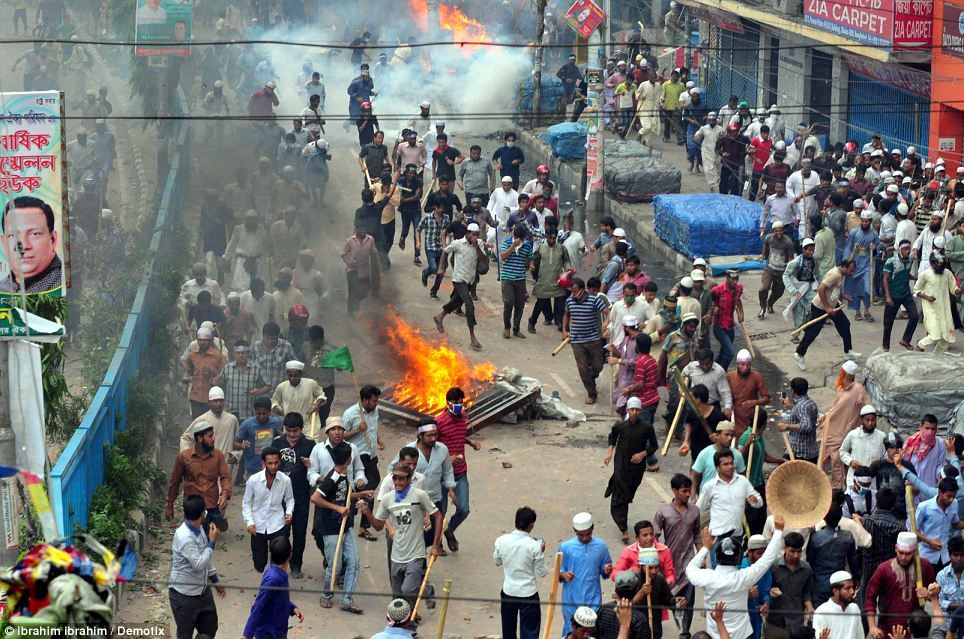Bangladesh: sectarianism is a terrible cancer in the society
(Bangladesh ASF)
Sectarianism has been a deadly disease in Bangladesh and India since time of immemorial. Thousands of men and women have fallen victim to this Sectarianism. Hindus have killed Muslims and Muslims have killed people of the Hindu community. Every time this riot has taken place, the politicians have been behind it. There was never a hand of a true religious saint or leaders.
Sectarianism means a kind of attitude. A person's attitude is defined as sectarian only when he is ready to oppose and harm another religious community and its members on the basis of belonging to a particular religious community. Individuals are secondary in this case, the main is wealth. Religious theory and ethics have to do with religiosity. There is the addition of sectarianism to the community. In other words, in the case of piety, one's own behavior and religion are more important. In the case of Sectarianism, a special kind of loyalty to one's own religious community is more important. Besides, true piety is the afterlife. The hope of his true reward in the Hereafter. The profit of sectarianism is in this world. Religiosity does not require opposition to others.
We must know what sectarianism is. Look. We are also victims. We have had riots in this country because of religious sectarianism. As a result of the riots, at one time undivided Bengal was divided (1947) into two parts, one part was annexed to Pakistan and the other to India. But did the riots stop? None of the two Bengals stopped.
Sectarianism did not end. In the end, we have broken the bond of religion-based nationalism and established an independent and sovereign Bangladesh in 1971. Even then, did sectarianism end?

No, it didn't. Not only the emotional sectarianism that has remained, but also the communal persecution has taken place. We are ashamed of the news of various persecutions of the minority Hindu community in many places since the 2001 general elections. Property grabbing, rape of women everything happened. So we must know how cruel, nasty and harmful the communal thing is. There is no reason not to know. I also know communalism. But I don't always notice what the matter is. I don't understand why this is happening. We are talking about religious communalism. Because of this sectarianism, people of two different religions hate each other. Hatred also breeds conflict. Bleeding occurs. As has happened in our country.
But in our country, people of different religions have been living together for ages. There was no clash between Hindu peasants and Muslim peasants. He did not want to overthrow each other. Hindu fishermen and Muslim fishermen have been fishing in the river together. The weavers are weaving looms. Ordinary people attended each other's religious ceremonies. The bells of the temple and the call to prayer of the mosque have merged. People have walked the same path, gone to the same market and traded, stayed under the same sky. He did not search for who is a Hindu or a Muslim, he did not sniff. So? Who created communalism? How was it made? Why?
Only the two middle classes on both sides - the Hindu middle class and the Muslim middle class. This started in the era of British imperialism. Before that there was community, but there was no communalism. During the British rule, the Hindu middle class was at least fifty years ahead of the emerging Muslim middle class in education and economic establishment. The Muslim middle class saw that the place was not so open, others had occupied it. The competition and rivalry between the two sides started. The occupants are from the Hindu community. The ruling British provoked both sides to escalate their feud. If the British gain, the quarrel will not be between the ruler and the ruler, it will be between the Hindus and the Muslims. Then divide and rule - this policy will be easier to implement.
There was a struggle for independence during the British rule. But Hindus and Muslims could not remain united in that struggle because of that communal conflict. Attempts were made to bring the two communities closer by resolving disputes in undivided Bengal. Chittaranjan Das advanced a bit. At his initiative an agreement was signed between the leaders of the two communities so that they agreed to share the job opportunities in half. This treaty was made in 1923, two years after which Chittaranjan passed away and needless to say that the treaty was not implemented at all, but the conflict between the two communities continued to grow, one riot after another and eventually Bengal was divided into two parts. The main reason is the conflict between the two middle classes, so that the British provocation worked very well. Sectarianism has come down from above. Didn't rise from the bottom up. After the death of Chittaranjan, free entry of all-India politics took place in Bengal. Both the Indian Congress and the Muslim League became very active. The Congress called itself secular, but in practice it was a Hindu-dominated institution. Gandhi himself was very secular, but he did not want to separate religion and politics, so the task of raising religious voices and fulfilling political objectives was not hindered at all. There were hardliner communal minded people in the Congress and they eventually became the main force, later they even assassinated Gandhi. The Muslim League, on the other hand, has developed as an institution of Muslims, with its leader Jinnah basing his politics on the doctrine of biracialism, meaning that Hindus and Muslims are two different nations in India. The politics of both the Congress and the League became communal politics. India was broken, Bengal was also torn in two, the main reason being that communal conflict and also the provocation of the British. But even then sectarianism did not end. Many hoped it would end. Because India became Hindu and Pakistan became Muslim. The dominance of the two communities in the two states is so strong that it was not at all possible that the minority community would be in conflict with the majority. In other words, the previous basis of sectarianism is no more. The conflict is over. But what is the reason that sectarianism is not over yet? The reason is material lust. To put it more clearly, greed for property. Property in this case means land, house, business-trade, job-job, opportunity-everything. The people of the majority community evicted the minorities and seized their property. In fact, this is the tyranny of the strong over the weak. The people of the strong, that is, the majority community, began to take away the property of the weak, that is, the minority community. The matter was looting, but a cover was given to it, it was religious. There are two advantages to religious cover. One. In this way the matter of looting can be arranged as a sacred duty. Two. It is also possible to create insanity in people by raising the issue of religion. We did not accept the state of Pakistan. We came out of his chains. Bangladesh has become independent. Bi nationalism has been abandoned. Religion-based nationalism has been replaced by language-based nationalism. But still sectarianism is not over. The reason for not being is nothing else, that is the possession of the property. The minority Hindus are weak here, the majority Muslims are therefore eager to seize their property. Not only Hindu property is being looted, but also Muslim property is going to the rich. But Hindu property is particularly vulnerable. First. Most Hindus are poor; Two. They are again low in number. Three. Religion can be used to occupy their property. Sectarianism is therefore not a matter of religion, it is a matter of religious businessmen. Religious traders continue to use religion to plunder freely during the British period, Pakistan period and even in the present period. That is why the end of sectarianism is not happening. The issue of sectarianism was understood. But the question is - what is the remedy? We need to look at the role of the state before looking for a remedy. During the British rule, the state incited communal strife. In the time of Pakistan, the state wanted to be considered as the enemy of Hindus and the independent state of Bangladesh cannot be said to be secular. This state was supposed to be secular. It has emerged as a secular state. But secularism is no longer in the constitution.
Americans are calling our state a Muslim state, we are not protesting. Not saying that our state is democratic. All citizens have equal rights here. The fact that we are not protesting means that those who rule us are not protesting. Neither of the two major parties is enthusiastic about it, neither party has the initiative to re-establish secularism in the constitution, but both parties are using religion politically. And they are our spokespersons everywhere.
Minorities do not feel safe. It is not a lie that their emigration is happening in silence. In our state, no citizen has security of life and livelihood. People from minority communities are particularly at risk. The main reason is the character of the state. We did not get the democratic state we dreamed of in 1971 and fought for. The biggest proof of this is the inequality of people here. The rich-poor inequality is the main one, the inequality between men and women is also clear and the old inequality between the majority and the minority has not ended.
We want to build a democratic federal society by abolishing the state. It is necessary to establish equal rights for all people irrespective of class, religion, gender and ethnicity. Otherwise, exploitation, plunder, communalism, oppression of nationalism will not end any disease. We will continue to suffer and the cable will weaken as we suffer. But how will the desired change in the character of the state? Through elections? He doesn't seem likely. Because one or the other of the two big parties will come to power in the election. Nationalists and capitalists will not want to change the character of the state, they will want to plunder the existing system intact. For that, it will be the duty of those who are humane and democratic to unite and move. There is no other way of liberation without movement.
We have to understand this. We have seen military rule, we have seen elections and we will see. Military government is illegitimate, elected government is legitimate. But the fate of the weak people does not change whether the government comes to power legally or illegally. One party goes to power through elections, another party leaves power. But the fate of the weak is not happy. So those who see the interests of the common man must be united. This is what the situation says. We need an overall social revolution.
Imperial power is not our friend; they are the enemy of the peasantry. They want to establish a chain in our society where people will be forced to sell themselves to imperialism, capitalists and feudalists will be in the hands of ordinary men and women. They want to bring people down to the level of animals.
If the communal power realizes their dream, it will be the defeat of the workers, peasants, small traders, poor people, men and women. They call for death what do they want to do for life? We want progress, freedom, justice, peace - can they give it? We want our resources to be in our country - but imperialism wants to take our resources. They want to make various excuses. None of them are our real enemies. They are also to blame for imperialism.
A kind of subtle conspiracy is going on. They want to steal our future. If we want to defeat them - we have to shed light on everything. In the name of religion, in the name of politics, in the name of democracy, all kinds of hypocrisy must end. We have to build our own future. The way of liberation must be found through the development of human life and not by killing people. I want Socialist enlightened people for a beautiful future.


